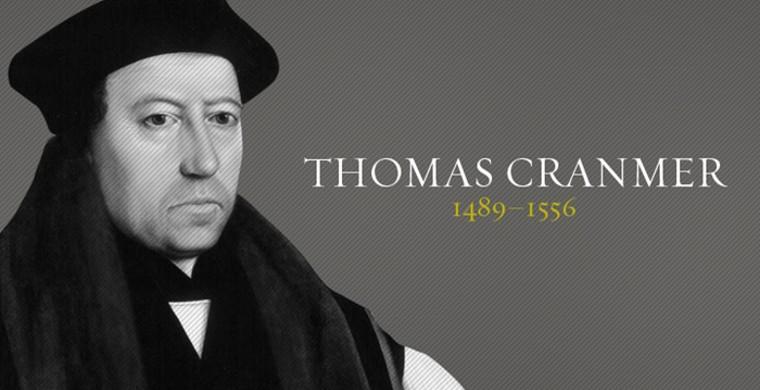Why Cranmer Would Have Approved of The Oxford Martyrs' Memorial
By Julian Mann
www.virtueonline.org
May 17, 2018
How many British national newspaper journalists apart from Peter Hitchens would be willing and able to write so knowledgeably about the sixteenth-century Protestant martyrs burned at the stake in Oxford? Surely not very many.
Mr Hitchens's highly educative piece about the English Protestant martyrs in First Things, the magazine for the New York-based Institute on Religion and Public Life, certainly achieved its purpose. It showed the moral difference between the Protestant Christians martyred under Mary Tudor and the Jesuit fanatics executed for high treason under Elizabeth Tudor. But his portrayal of the conduct in the fire of persecution of respectively Bishop Hugh Latimer, burnt at the stake in 1555, and Archbishop Thomas Cranmer, burnt in 1556, calls for a rejoinder for the sake of a more complete picture of the Church of England's theology as expressed in its historic formularies, namely its 1662 Book of Common Prayer, Ordinal and 39 Articles of Religion.
Stylishly as usual, Orwell Prize winner Mr Hitchens wrote: 'I usually salute the actual site of the burnings as I pass (bicycling in Oxford), though mainly in memory of Thomas Cranmer, rather more to my liking than Latimer or Ridley, because he really wasn't very brave. Cranmer had been made to watch the deaths of his old friends, so he knew exactly what to expect and fear. He was reduced to ashes in the same place (then a bleak and squalid ditch) some time later. He had weakly recanted, then found out that Queen Mary wanted him burned to death anyway. She had not forgiven Cranmer's part in annulling her mother's marriage and making her illegitimate in the eyes of the law. Faced with this act of spite, this political, equivocal old cleric at last found his courage. I find Cranmer's hesitant and initially cowardly response to persecution and threats much easier to sympathize with than Latimer's self-assured militancy.'
Certainly, Cranmer signed a recantation of his evangelical convictions under Mary's threats whilst Latimer did not. But at the actual point of their deaths, as John Foxe recorded their words in his 1563 Book of Martyrs, they expressed their evangelical convictions with theological clarity, a description to be preferred to 'self-assured militancy', which implies intellectually shallow fanaticism. Latimer, who had been Bishop of Worcester, famously exhorted his fellow victim, Nicholas Ridley, formerly Bishop of London, to 'be of good comfort, Master Ridley, and play the man. We shall this day light such a candle by God's grace, in England, as I trust shall never be put out.'
Foxe recorded Cranmer as saying the following at the point of his death: 'And now I come to the great thing that troubleth my conscience more than any other thing that ever I said or did in my life: and that is, the setting abroad of writings contrary to the truth. Which here now I renounce and refuse, as things written with my hand contrary to the truth which I thought in my heart, and writ for fear of death, and to save my life, if it might be: and that is, all such bills, which I have written or signed with mine own hand, since my degradation; wherein I have written many things untrue. And forasmuch as my hand offended in writing contrary to my heart, therefore my hand shall first be punished. For if I may come to the fire, it shall be first burned. And as for the Pope, I refuse him, as Christ's enemy and antichrist, with all his false doctrine."
Cranmer's final outpouring of his evangelical heart thoroughly tallies with the theology of the historic Anglican formularies for which he was largely responsible. The 1662 Book of Common Prayer is almost entirely his 1552 Prayer Book and the 39 Articles of Religion, adopted by Elizabeth's Parliament in 1571, are largely based on the 42 Articles formulated by Cranmer and published in 1553.
The Book of Common Prayer and the 39 Articles of Religion remain authoritative expressions of the biblical doctrine of the Church of England, as stated in its Canon A5: 'The doctrine of the Church of England is grounded in the Holy Scriptures, and in such teachings of the ancient Fathers and Councils of the Church as are agreeable to the said Scriptures. In particular such doctrine is to be found in the Thirty-nine Articles of Religion, The Book of Common Prayer, and the Ordinal.'
Here, for example, is the 39 Articles' view of transubstantiation, which remains the belief of the Roman Catholic Church to this day: 'Transubstantiation (or the change in the substance of the Bread and Wine) in the Supper of the Lord, cannot be proved by holy Writ; but is repugnant to the plain words of Scripture, overthroweth the nature of a Sacrament, and hath given occasion to many superstitions' (Article 28).
Articles like these express Cranmer's evangelical theology and the official theology of the Church of England. So, if the inscription on the nineteenth-century Martyrs' Memorial in Oxford is 'sectarian', as Mr Hitchens claims, then so was Cranmer and so is the Church of England:
'To the Glory of God, and in grateful commemoration of His servants, Thomas Cranmer, Nicholas Ridley, Hugh Latimer, Prelates of the Church of England who near this spot yielded their bodies to be burned, bearing witness to the sacred truths which they had affirmed and maintained against the errors of the Church of Rome and rejoicing that to them it was given not only to believe in Christ, but also to suffer for His sake.'
Actually, Cranmer the evangelical, as Professor Diarmaid MacCulloch described the theological outlook of the Henrician Reformers in his masterly 1996 biography (Thomas Cranmer, Yale University Press), would have heartily agreed with the Victorian evangelical who penned the above.
Julian Mann is vicar of the Parish Church of the Ascension, Oughtibridge, South Yorkshire, UK --www.oughtibridgechurch.org.uk














